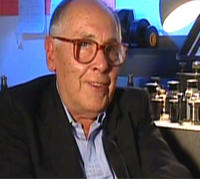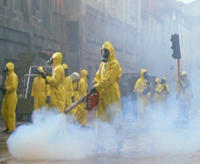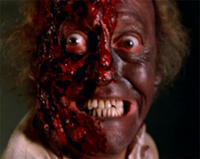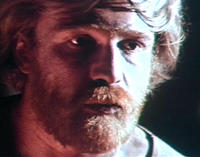 There are a number of directors that’s considered to be important directors. Alfred Hitchcock, Frederico Fellini, Fritz Lang, Luchino Visconti and so on, but since 1987, there has been one name that’s been neglected from this high esteemed trophy room: Andreas Schnaas. Never before has the world been witnessed to the terrorizing fear Schnaas forced the viewer upon his 1987 masterpiece; Violent Shit. The forests of Germany was never more terrifying than when Schnaas let his homemade camera loose on it.Violent Shit marks a special place in film history. It described a new and innovative way of filmmaking, as Andreas explored his creativity on levels never before seen on the screen. Although the film was never critically acclaimed, as was neither Schnaas, I’m am sure that destiny will serve the film right and it will get it’s long overdue recognition (which, in all due respects, only an Academy Award will justify).
There are a number of directors that’s considered to be important directors. Alfred Hitchcock, Frederico Fellini, Fritz Lang, Luchino Visconti and so on, but since 1987, there has been one name that’s been neglected from this high esteemed trophy room: Andreas Schnaas. Never before has the world been witnessed to the terrorizing fear Schnaas forced the viewer upon his 1987 masterpiece; Violent Shit. The forests of Germany was never more terrifying than when Schnaas let his homemade camera loose on it.Violent Shit marks a special place in film history. It described a new and innovative way of filmmaking, as Andreas explored his creativity on levels never before seen on the screen. Although the film was never critically acclaimed, as was neither Schnaas, I’m am sure that destiny will serve the film right and it will get it’s long overdue recognition (which, in all due respects, only an Academy Award will justify).

So, even though Violent Shit was no success, it wasn’t a reason to just give up. Oh no, not long after, Andreas followed up with what would become his ultimate masterpiece: Violent Shit 2: Mother Hold My Hand. With flare of a Hitchcockian touch, Violent Shit 2 marks it’s own path in world history. Filled with blood, the screen ghastly turned red as the scenes of bloodshed continued in a high-octane speed. A more shocking experience it becomes, when hooks are penetrated through sexual organs, which might suggest a scream of sexual desired freedom from Schnaas himself!
Continuing with The Goblet of Gore and another sequel to Violent Shit, a spectacular revolution fell upon the world when Andreas Schnaas in 1999 made a deep and artistic tribute to the immortal souls of Italian cinema, with his film; Anthropophagous 2000. Tears fell from my eyes when the deeply harrowing character developments moved into psychological levels I had never dreamed of. It was a heartbreaking and poignant film, which has put its stain on cinematic visionary forever.

Yes, indeed, Schnaas has put his mark in all of us fans. Unfortunatley, the future destination for Schnaas towards the recognition he deserves seems far fetched. But fear not, the fanatics of the german master will always remain as a throne of eternal fire.
 If you have seen a lot of Italian films – not only horror films, but other genre films as well, you’ll notice that the directors are split three ways: the good, the bad and the worst. Bruno Mattei is, unfortunately, one director that’s been placed in the latter category by many. I sat down and watched my first Bruno-film a year and a half ago, Hell of the Living Dead, and I could not understand what everybody was talking about. This man, this tiny little Italian, was a competent cinematic genius. An artist with perfectionism as his one and only limit. A man, who discovered new, unexplored areas of cinema itself.
If you have seen a lot of Italian films – not only horror films, but other genre films as well, you’ll notice that the directors are split three ways: the good, the bad and the worst. Bruno Mattei is, unfortunately, one director that’s been placed in the latter category by many. I sat down and watched my first Bruno-film a year and a half ago, Hell of the Living Dead, and I could not understand what everybody was talking about. This man, this tiny little Italian, was a competent cinematic genius. An artist with perfectionism as his one and only limit. A man, who discovered new, unexplored areas of cinema itself.

Bruno went through his career visiting a lot of genres. Action, horror, exploitation, spaghetti western and so on, and he always handled the genres with top-notch solid direction with well thought through scripts. His scripts, exceptionally well written by Claudio Fragasso, featured some amazing dialogue. One example of this, is in the hi-tech jungle action film, Robowar; “Why do they have nicknames? You should know what the group is called; BAM. BAM? Big Ass Motherfuckers.” How on earth did this film not get a US-release?
While exploring his artistic genius, Bruno was throughout his career incorrectly blamed for copying other people’s work. Sure, he used stock footage in films like Hell of the Living Dead, Cruel Jaws and even a scene in Double Target, but that only adds to his originality by exploring the field of stock-footage. Sure, he picked up small pieces of inspiration here and there, but when the results were shown, it was the result of a unique pioneer.
Whether it was blood soaking terror or action spectacular, Bruno always kept his style of terror and suspense – easily compared to Hitchcock. His nerve-wracking stories of zombies, humanoid robots, naughty cowboys, realistic stock-footage, or sexual preferences were terrifyingly frightening. Bruno Mattei is a true maestro, and needs to be acknowledged for this.
 For all those veterans out there who’s familiar with Italian genre films, one often discover these recognizable actors even though they didn’t play any particularly important roles. Often, these actors have a great charm because they are connected with a style of filmmaking which manages to present their characters in a…perhaps somewhat odd way. One example of this is Luciano Pigozzi (aka Allan Collins), who’s appeared in countless Italian films in these small parts. Another example is Al Cliver.
For all those veterans out there who’s familiar with Italian genre films, one often discover these recognizable actors even though they didn’t play any particularly important roles. Often, these actors have a great charm because they are connected with a style of filmmaking which manages to present their characters in a…perhaps somewhat odd way. One example of this is Luciano Pigozzi (aka Allan Collins), who’s appeared in countless Italian films in these small parts. Another example is Al Cliver.
Now, if you’ve learned to see the two different versions of Al Cliver on screen (the beardy Cliver and the shaved Cliver), it can only mean one thing; you’re a veteran. It’s strange how his appearance almost completely changes once he sadly decides to shave himself.
Al had an undistinguished career in Italian cinema, always turning up every here and there. It’s sad that no one picked up on his amazing talent for acting. That is because Al is the fulfilment of Hugo Stiglitz. He has the non-facial expression of Stiglitz, but also shows some signs of expressions every now and then. It is an amazing thing that allowed Al to be both stiff and normal. Sometimes at the same time! I remember a scene in Zombie, where Al’s wife gets killed. Al just stood there and watched, like he was in shock. The realism in that scene truley reflects real life. I couldn’t believe my own eyes!
I thought this guy was interesting. His manly beard inspired me to grow my own (with little success), as well as his juicy haircut. How this man went so unnoticed in throughout his career is beyond me.
 In 1983, master Joe D’amato, along with Al Cliver, created motion picture history when D’amato made one of the all time masterpieces: Endgame – Bronx Lotta finale. Al Cliver made his greatest performance, this time as the leading man. Unfortunately, Cliver was never recognized for his downright breathtaking performance, and his career started going downhill. Al Cliver had an uncompromising talent for acting, and was unjustly never recognized. His acting abilities were revolutionary in the Italian film industry, and because of this, Italian cinema will never be the same again. Thank you Al, for everything.
In 1983, master Joe D’amato, along with Al Cliver, created motion picture history when D’amato made one of the all time masterpieces: Endgame – Bronx Lotta finale. Al Cliver made his greatest performance, this time as the leading man. Unfortunately, Cliver was never recognized for his downright breathtaking performance, and his career started going downhill. Al Cliver had an uncompromising talent for acting, and was unjustly never recognized. His acting abilities were revolutionary in the Italian film industry, and because of this, Italian cinema will never be the same again. Thank you Al, for everything.

Long ago, in the time horror films still scared me to death, I was very fascinated by European horror films. Not because they where particularly scary, but because of the irresistible charming content. The way the directors managed to exploit the tiny budget to the very limits, and make films by going outside the book, intrigued me because it was a new way of filmmaking compared to what was traditional at the time. Films shot without sound that had to be dubbed over afterwards was something I wasn’t used to. I didn’t like it at first, but I got used to it and discovered the charm behind it all. When leading actors were dubbed by other voices, it threw a whole new definition of what could be called ‘good acting’. Whether or not Mexican actor, Hugo Stilgitz dubbed himself, I don’t dare to speculate in. But even if he did it or not, I don’t believe it would have changed his unique way of acting.
I remember at a young age I watched my very first Stiglitz-film; Nightmare City. I wasn’t very familiar with European horror films at the time, so all of this was very new to me. The film itself was amazingly entertaining and almost groundbreaking considering what I'd been used to.
Contaminated people running around and killing everyone?
Well, I suppose there is more to it than that. But I didn’t find the entertainment in this aspect of the film alone. Oh, certainly not! There was a certain stud of a leading man in this film. He introduced me to a whole new concept of acting. Stiglitz was stiff, relentless (the way he went around slapping his wife) and a perfect example of a great macho figure. His character interpretation of Dean Miller, the leading character, was for me one of the most giving performances I'd even seen. Hugo’s technique was unique in the way he always stood up against the infected citizens without changing as much as a movement in his face. Even in the most feared sequences, Stiglitz always kept himself calm and relaxed without even raising his voice. With his stylish moustache and downright fantastic beard along with his curly hair, Stiglitz sawed his way through the infected ones without showing a single sign of fear. I could not believe my own eyes! It was incredibly realistic. Suddenly, Stiglitz became a role model for what good acting was all about: to be brave, stiff and not give away any facial expressions at all!
 I felt this urge to explore more of Hugo Stiglitz's films and to discover his huge broadness as an actor. From playing Robinson Crusoe (twice!), to the homosexualised Esteban in Tintorera (1977) and then moved on to act in in based-upon-true-stories catastrophe films like Survive!, The Bermuda Triangle, Cyclone and Guyana: Crime of the Century. Never before have i seen such an actor in work. Hugo Stiglitz is a modern actor, an artist of the cinema, and truly belongs in the history books as one of the greatest of the greatest.
I felt this urge to explore more of Hugo Stiglitz's films and to discover his huge broadness as an actor. From playing Robinson Crusoe (twice!), to the homosexualised Esteban in Tintorera (1977) and then moved on to act in in based-upon-true-stories catastrophe films like Survive!, The Bermuda Triangle, Cyclone and Guyana: Crime of the Century. Never before have i seen such an actor in work. Hugo Stiglitz is a modern actor, an artist of the cinema, and truly belongs in the history books as one of the greatest of the greatest.












